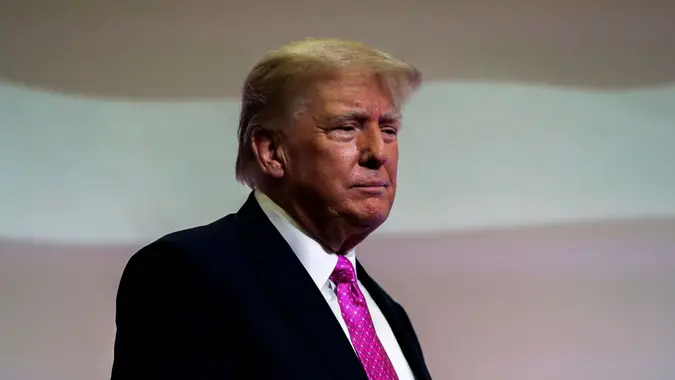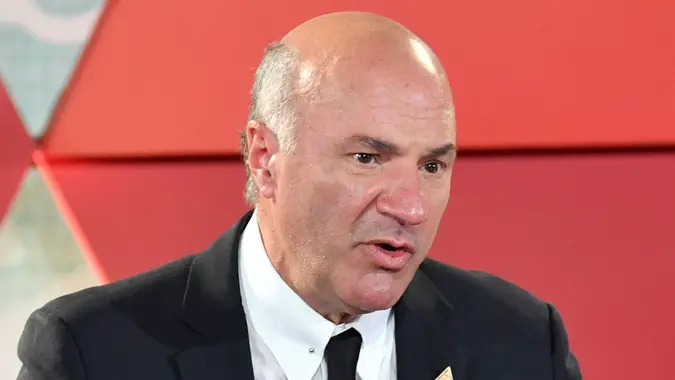How a Trump Win in 2024 Could Impact Your Retirement Savings

Commitment to Our Readers
GOBankingRates' editorial team is committed to bringing you unbiased reviews and information. We use data-driven methodologies to evaluate financial products and services - our reviews and ratings are not influenced by advertisers. You can read more about our editorial guidelines and our products and services review methodology.

20 Years
Helping You Live Richer

Reviewed
by Experts

Trusted by
Millions of Readers
During his term as president, Donald Trump’s most significant impact on retirement savings was the Setting Every Community Up for Retirement (SECURE) Act, which became law on Jan. 1, 2020.
By most accounts, the bipartisan legislation improved America’s retirement landscape by removing age restrictions on who can open tax-advantaged IRAs, making it easier for 401(k)s to offer annuities, eliminating red tape so small businesses could pool resources to offer plans to their employees, providing tax credits to small businesses that auto-enrolled their workers and raising the required minimum distribution (RMD) age from 70½ to 72.
With Trump cruising through the Republican primaries toward what appears to be an all-but-inevitable nomination to run for a second term, here’s how your retirement savings might change if he emerges victorious in November.
ESG Funds Could Face Stiff Regulations or Bans
In early 2023, Trump released a campaign video reiterating his opposition to ESG investing. Short for environmental, social and governance, fund managers use ESG standards to factor a company’s sustainability and societal impact into decisions about including their stocks among their holdings.
The topic has become a political hot-button that is sure to bleed into the coming elections. Last year, 25 Republican-controlled states filed a lawsuit claiming that allowing retirement advisors to consider ESG standards violates bias clauses in the Employment Retirement Income Security Act and Administrative Procedure Act, which regulate retirement plans.
A judge rejected the lawsuit and kept the Biden administration’s pro-ESG rules in place.
While in office, Trump restricted ESG investing in retirement plans, affecting $12 trillion worth of capital and 150 million investors. The Biden administration later reversed the rule, triggering the lawsuit.
If Trump is re-elected — particularly if the GOP sweeps Congress — you can expect strict regulation or outright bans on ESG in retirement funds and pensions. When he posted his campaign video, Trump wrote, “We MUST protect Americans from Radical Leftist ESG investments — I did it once, and it’s time to do it again as I set the example for Republicans across the Country to follow my lead in fighting ESG!”
A New Trade War Could Trigger Intense Market Volatility
One of the hallmarks of Trump’s presidential term was a protracted trade war with China. The president’s weapon was punitive tariffs, which, according to a Forbes report from the time, mostly passed the increased price of imports onto American consumers.
Forbes — rated “center” by media bias watchdog AllSides — outlined how China’s response to American tariffs created stock market turmoil. When Trump levied a 10% tax on nearly all the $540 billion in goods the U.S. purchases from China annually, the country responded by “weaponizing” its currency and suspending agricultural purchases as it dug in for a long fight.
Forbes wrote, “The markets don’t like this since there is a high chance of recession within the year if this trade war heats up.”
The last time China had devalued its yuan, the S&P 500 cratered by 3.57% in one day. That was August 2019, and the impending COVID-19 pandemic soon rendered those predictions academic. But a second Trump term might put them to the test, as he has publicly vowed to renew his trade wars with new tariffs on more countries.
‘Negative Impacts on Firms and Their Shareholders’
The Wall Street Journal, rated “center,” lauded Trump’s signature first-term tax package, which it said mitigated the impact of his trade war. But the publication was less optimistic about the impact of another round of tariffs if he’s reelected.
On Jan. 24, it wrote, “In his second term, no such tax plan is waiting in the wings. Instead, Trump wants to expand the trade war he started six years ago by hitting a range of trading partners with steep new tariffs. The tit-for-tat retaliation, higher costs, and supply-chain disruptions make for a less benign landscape than what prevailed before the Covid-19 pandemic hit in 2020.”
In the wake of the trade war in 2020, Forbes wrote, “The U.S.-China trade war depressed stock prices, which implies negative impacts on firms and their shareholders. Shareholders lost money, and the lower returns to capital causes firms to invest less.”
Forbes estimates Trump’s first trade war cost U.S. stock prices $1.7 trillion. If Trump wins, another trade war is likely. Work with a financial professional to diversify and hedge against potential stock market turmoil.
Talk to Your Advisor About Your Bond Holdings
Trump’s signature Tax Cuts and Jobs Act of 2017 cut the top corporate tax rate from 35% to 21%. Campaigning for 2024, he has vowed to lower it even further to 15%, CNBC reported.
The Financial Times, rated “center,” expects Trump to “spend and cut taxes without restraint,” presuming a united Republican Congress. “That will drive inflation expectations up and bond prices down. The only question is whether the bond market starts pricing this in next year or waits until Trump is elected,” the publication wrote in November 2023.
CNBC, rated “center,” predicted on Jan. 23 that “a second Donald Trump presidency… could trigger a ‘tantrum’ in long-duration bond markets.”
If the economy is strong and the Fed reduces interest rates after pulling off a “soft landing” — reducing inflation without triggering a recession — yields will likely rise. If the economy weakens and Trump cuts taxes, increases spending or both in the face of a 6% to 8% deficit, the bond market is more likely to hold steady.
 Written by
Written by  Edited by
Edited by 

























